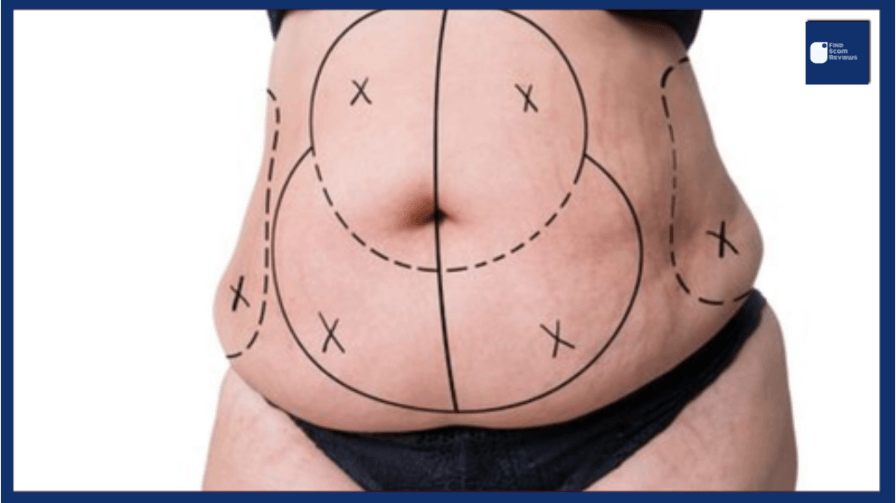
Do you lose weight after liposuction? – 5 things you need to know before getting liposuction.
Liposuction is probably not the first thing to come to mind when you think of weight loss. However, many people do lose weight after the surgery. If you’re thinking about getting liposuction, it’s crucial to understand how it can help you lose weight and what you need to know before getting it done.
Here are five things you need to know before deciding if liposuction is right for you.
What liposuction is and how it works
Liposuction is a cosmetic procedure involving removing fat from specific areas of the body. It is typically performed on the abdomen, hips, thighs, and buttocks.
Liposuction can be performed using various techniques, but the most common involves using a cannula (a hollow tube) to suction the fat from the target problem areas. The fat is then removed through a small incision in the skin.
The liposuction procedure is generally safe, but risks are involved with any surgery. These include infection, bleeding, and bruising. The most common complications from liposuction are temporary and mild. More severe complications are rare but can form blood clots and damage nerves or blood vessels and asymmetry.
Liposuction is not a weight loss procedure or an effective obesity treatment. It is also not an alternative to a healthy lifestyle and regular exercise. However, it can be an effective way to contour the body and improve self-esteem.
How to prepare for liposuction surgery

Liposuction is a surgical procedure that removes pounds of fat from the body using a suction device. It is most commonly used to improve the appearance of the thighs, buttocks, and abdomen, but it can also be used to treat other areas of the body, such as the upper arms, neck, love handles, tummy tuck, and back.
The best candidates for liposuction are people within 30% of their ideal weight, have good skin elasticity, and have localized areas of fat resistant to a healthy diet and exercise. Liposuction is not a weight-loss surgery, and it is not recommended for people who are obese or have significant health risks.
If you are considering liposuction surgery, you must consult with a board-certified plastic surgeon. During your consultation, the surgeon will evaluate your medical history and physical condition to determine if you are a good candidate for surgery.
They will also discuss your goals and expectations for surgery. It is essential to be honest with your surgeon about your goals so that they can create a treatment plan that is right for you. Once you have decided to proceed with surgery, there are some things you can do to prepare for the procedure.
First, you will need to arrange for someone to drive you home after the surgery. You should also arrange for someone to stay with you for at least the first 24 hours after surgery. You will likely experience some pain and discomfort after the surgery, so taking pain medication as prescribed by your surgeon is essential.
Resting and keeping your head elevated after surgery is necessary to reduce swelling. You should also avoid strenuous activity or exercise for at least four weeks after surgery. Following these instructions will help you recover from surgery as quickly and safely as possible.
What to expect during and after the surgery
Liposuction surgery is a popular procedure that can help to contour the body by removing stubborn pockets of fat. The surgery is typically performed using a small, tube-like device called a cannula.
A surgeon will make a small incision in the skin and then insert the cannula into the fatty adipose tissue. The cannula is then used to suction out the excess fat. Liposuction surgery is usually performed on an outpatient basis, and most people can return to normal activities within a few days.
After the surgery, there may be some swelling and bruising, but this should subside within a few weeks. Results from liposuction surgery are typically long-lasting, provided that patients maintain a healthy weight.
The risks associated with liposuction surgery

Liposuction is a cosmetic surgery that removes fat from the body. It is typically used to improve the appearance of the thighs, stomach, and arms. Liposuction surgery carries several risks, including infection, bleeding, and death. The most common complication of liposuction surgery is infection.
Infection can occur at the incision site, deep tissue, or the bloodstream. Bleeding is another common complication of liposuction surgery. Bleeding can occur during the procedure or after the incision has been made.
In some cases, bleeding can lead to death. Death is a rare complication of liposuction surgery, but it can occur if the patient has an underlying medical condition or if there are complications with the surgery itself. Liposuction surgery is a safe and effective way to improve the body’s appearance.
However, as with any surgical procedure, there are risks associated with liposuction surgery. Patients should discuss these risks with their doctor before undergoing any cosmetic procedure.
How to care for your surgical site after the procedure is complete
It is essential to care for your surgical site after liposuction surgery is complete. You should keep the treatment areas clean and dry and follow your surgeon’s instructions for wound care. You may need to take antibiotics to help prevent infection.
It is also important to avoid strenuous activity or exercise training for at least four weeks after surgery. Following these instructions will help you recover from surgery as quickly and safely as possible.
ALSO READ: Does a BBL Make You Lose Weight? Discover This 1 Report
FAQs About Liposuction Surgery

How long does it take to lose weight after liposuction?
Liposuction is a popular cosmetic procedure that can result in a significant amount of weight loss. However, the results of the surgery are not immediate. It can take several weeks or even months for the full effects of the surgery to be visible.
The amount of time it takes to see results after liposuction will vary from person to person. Some people may see a difference in their appearance within a few weeks, while others may not see results for several months.
In general, it is essential to be patient and give your body time to heal after surgery before expecting to see significant weight loss.
How much weight can you lose with Vaser liposuction?
Vaser liposuction is a fat removal surgery that uses sound waves to break up and remove body fat cells from the body. The average person can expect to lose 3-5 liters of fat with this procedure, equivalent to 6-10 pounds of weight loss.
Additionally, patients can expect a reduction in their overall circumference and an improvement in their body contours. While results of liposuction will vary from patient to patient, most people are delighted with their best results following Vaser liposuction.
If you are interested in this procedure, be sure to consult with a board-certified plastic surgeon to discuss your specific goals and concerns.
Does your weight change after liposuction?
Liposuction is a surgical procedure that removes excess fat from specific body areas. Although it can lead to a more sculpted appearance, liposuction is not a weight loss solution. Most people weigh the same after surgery as they did before.
This is because liposuction only removes unwanted fat cells without changing your body weight. However, you may see a change in the scale after surgery due to fluid loss. During the procedure, fluids such as blood and anesthetic are removed along with the fat cells.
This can lead to dehydration and temporary weight loss. Most people regain any lost fluids within a week or two after surgery. So while liposuction may not lead to long-term goal weight loss, it can help you achieve your desired shape.
Why do I weigh more after liposuction?
One common misconception about liposuction is that it will help you lose weight. The goal of liposuction is not weight loss but instead sculpting the body by removing unwanted pockets of fat.
Because of this, patients often mistakenly believe that they will weigh less after the procedure. However, a few factors can contribute to post-liposuction weight gain.
First, the body typically holds on to fluid in the days and weeks following surgery, which can lead to temporary swelling and weight gain.
Second, patients may be less active during their recovery, leading to a slower metabolism and increased calorie retention.
Finally, liposuction removes fat cells and some moisture and supports connective tissue. This tissue loss can cause the skin to sag, making it appear more prominent than before surgery.
Although liposuction can give you the slim and contoured figure you desire, it is not a weight-loss solution.
What are the adverse effects of liposuction?
Liposuction is a surgical procedure that removes fatty deposits from the body. Although it can result in a more aesthetically pleasing appearance, this procedure has several potential drawbacks:
1) Liposuction is associated with a risk of bleeding and infection.
2) Suctioning can damage delicate bodily tissues, resulting in bruising and swelling.
3) As with any surgery, there is always the possibility of complications arising during or after the procedure.
4) Liposuction is an expensive procedure not typically covered by insurance.
For these reasons, it is crucial to weigh the risks and benefits of liposuction before undergoing the procedure.
Does liposuction speed up your metabolism?
Liposuction is a cosmetic procedure that removes excess fat from the body. The fat is removed through suction, and the area is usually left to heal with a compression garment in place.
Although liposuction can be an effective way to improve your appearance, it is essential to understand that the procedure will not speed up your metabolism.
Patients who undergo liposuction may see a slowdown in their metabolism as the body goes into “survival mode” in response to losing fat. For this reason, liposuction should not be seen as a weight loss solution.
Instead, it is the best way used to contour the body and improve appearance. If you are considering liposuction, discuss your goals and expectations with your surgeon to ensure that the procedure is proper for you.
Conclusion – Do you lose weight after liposuction?
Though liposuction is not a weight-loss procedure, many people do lose weight after the surgery. This is because the surgery helps to remove fat cells from the area, which can help improve your overall body shape.
If you are considering liposuction surgery, it is essential to talk with your surgeon about your cosmetic goals and expectations so that they can create a treatment plan that is right for you. Following these instructions will help you recover from surgery as quickly and safely as possible.
NOTICE
Affiliate Disclosure
The links contained in this product review may result in a small commission if you opt to purchase the product recommended. This goes towards supporting our research and editorial team and please know we only recommend high-quality products.
Disclaimer
This content including advice provides generic information only. It is in no way a substitute for a qualified medical opinion. Always consult a specialist or your doctor for more information.
While the information shared here can be helpful, please remember that it is not a replacement for advice from a licensed medical professional. If you have concerns or are taking medication, please speak with a doctor before making any decisions.
Additionally, keep in mind that individual results may vary as these products are not regulated by the Food and Drug Administration. These products are not designed to diagnose, treat, cure or prevent any disease.









